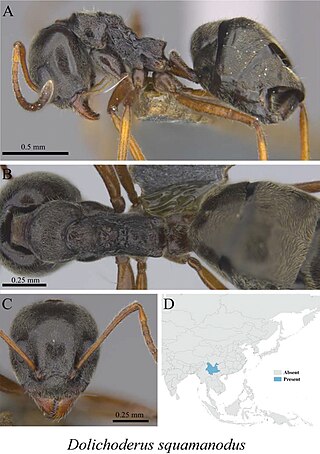
Dolichoderus is a genus of ants found worldwide.
Dolichoderus angusticornis is a species of ant in the genus Dolichoderus. Described by John S. Clark in 1930, the species is endemic to Australia, found in dry scrub heath in Western Australia and South Australia. Workers are diurnal and foraging during the day and at night.

Dolichoderus balticus is an extinct species of Eocene ant in the genus Dolichoderus. Described by Mayr in 1868, the fossils of a worker, queen and male of the species were discovered in the Baltic Amber.

Dolichoderus bispinosus is a species of ant in the genus Dolichoderus. Described by Olivier in 1792, the species is found in many countries, including Belize, Brazil, Colombia, Costa Rica, French Guiana, Guatemala, Guyana, Honduras, Mexico, Panama, Paraguay, Peru, Suriname, Trinidad and Tobago, Venezuela.
Dolichoderus brevicornis is a species of ant in the genus Dolichoderus. Described by Dlussky in 2002, remains of the species were discovered in the Baltic Amber.

Dolichoderus cornutus is an extinct species of Eocene ant in the genus Dolichoderus. Described by Mayr in 1868, the fossils were discovered in the Baltic amber, where a fossilised worker ant was only described, and it is presumed these ants existed at least 40 million years ago.
Dolichoderus elegans is an extinct species of Eocene ant in the genus Dolichoderus. Described by William Morton Wheeler in 1915, the fossilised remains of the species were found in the Baltic amber.

Dolichoderus feae is a species of ant in the genus Dolichoderus. Described by Carlo Emery in 1889, it is endemic to multiple countries, notably China, India, Myanmar (Burma) and Thailand.
Dolichoderus gordoni is a species of ant in the genus Dolichoderus. Described by Shattuck and Marsden in 2013, the species is only known from southern Queensland in Australia, mainly around forested areas.

Dolichoderus kinabaluensis is a species of ant in the genus Dolichoderus. Described by Dill in 2002, the species is endemic to Borneo.
Dolichoderus kutscheri is an extinct species of ant in the genus Dolichoderus. Described by Dlussky in 2008, the fossils of the species were found in the Bitterfeld amber, and is most likely to be from the Late Oligocene.
Dolichoderus pastorulus is a species of ant in the genus Dolichoderus. Described by Dill in 2002, the species is endemic to Borneo.

Dolichoderus punctatus is an extinct species of Eocene ant in the genus Dolichoderus. Described by Dlussky in 2008, fossils of the species were found in the Baltic Amber.

Dolichoderus squamanodus is a species of ant in the genus Dolichoderus. Described by Xu in 2001, the species is endemic to China.

Dolichoderus sulcaticeps is a species of ant in the genus Dolichoderus. Described by Mayr in 1870, the species is endemic to Borneo, Indonesia, Malaysia, Thailand and Vietnam.

Dolichoderus taschenbergi is a species of ant in the genus Dolichoderus. Described by Mayr in 1866, the species is endemic to Canada and the United States.

Dolichoderus vectensis is an extinct species of the Oligocene ant in the genus Dolichoderus. Described by Horace Donisthorpe in 1920, the fossils of the species were found in the United Kingdom.
Dolichoderus pinguis is an extinct species of formicid in the ant subfamily Dolichoderinae known from a fossil found in Asia. The species is one of a number in the genus described from fossils.










